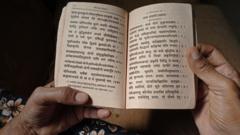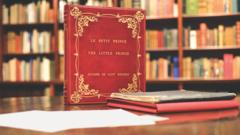In a groundbreaking exploration of William Shakespeare's personal life, recent revelations challenge long-held beliefs about his marriage to Anne Hathaway. The analysis, spearheaded by literature professor Matthew Steggle from the University of Bristol, sheds new light on a previously overlooked letter fragment which is causing scholars to rethink the conventional narrative that cast Shakespeare as a distant husband.
Traditionally, the story of Shakespeare's life has framed him as a literary figure who escaped domestic life in Stratford-upon-Avon for the allure of London. It was widely accepted that his wife, Anne, was a burden, a sentiment articulated by a 19th-century essayist who described her as a source of "humiliation" for the aspiring playwright. This notion was perpetuated by Shakespeare’s will in which he famously bequeathed his wife his “second best bed,” a gesture interpreted as an indication of his disregard for their marriage.
However, the recently studied letter, which addresses "Mrs Shakspaire," was found embedded in the binding of a 1608 book and contains response elements that indicate Anne's involvement. Discovered during a routine examination, the correspondence had previously garnered minimal attention since its initial note by an amateur historian in 1978. It wasn't until technological advancements allowed deeper tracking of referenced individuals that its significance began to surface.
Steggle's findings, expected to appear in an upcoming issue of the journal *Shakespeare*, suggest that Shakespeare's connection with Anne was likely far more complex than earlier interpretations. The evidence compels scholars to consider a narrative where Shakespeare maintained a meaningful relationship with Anne while carving out his identity as a playwright, challenging the stereotype of the isolated artist.
As scholars anticipate the publication of Steggle's research, the Shakespearean narrative continues to evolve, proving that even the most established historical figures can still reveal surprising facets of their lives with the right inquiries.
Traditionally, the story of Shakespeare's life has framed him as a literary figure who escaped domestic life in Stratford-upon-Avon for the allure of London. It was widely accepted that his wife, Anne, was a burden, a sentiment articulated by a 19th-century essayist who described her as a source of "humiliation" for the aspiring playwright. This notion was perpetuated by Shakespeare’s will in which he famously bequeathed his wife his “second best bed,” a gesture interpreted as an indication of his disregard for their marriage.
However, the recently studied letter, which addresses "Mrs Shakspaire," was found embedded in the binding of a 1608 book and contains response elements that indicate Anne's involvement. Discovered during a routine examination, the correspondence had previously garnered minimal attention since its initial note by an amateur historian in 1978. It wasn't until technological advancements allowed deeper tracking of referenced individuals that its significance began to surface.
Steggle's findings, expected to appear in an upcoming issue of the journal *Shakespeare*, suggest that Shakespeare's connection with Anne was likely far more complex than earlier interpretations. The evidence compels scholars to consider a narrative where Shakespeare maintained a meaningful relationship with Anne while carving out his identity as a playwright, challenging the stereotype of the isolated artist.
As scholars anticipate the publication of Steggle's research, the Shakespearean narrative continues to evolve, proving that even the most established historical figures can still reveal surprising facets of their lives with the right inquiries.















